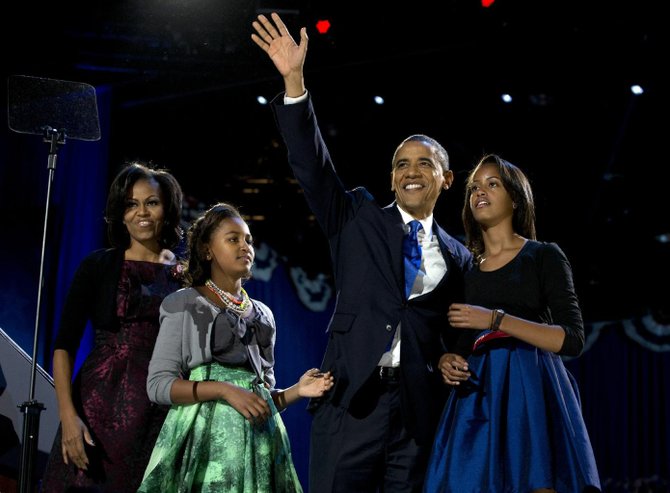President Barack Obama was re-elected on November 6, 2012. Here he is surrounded by his family at his party in Chicago, IL.
WASHINGTON (AP) — Voters who feel the economic outlook brightening after years of misery and believe Barack Obama better understands people like themselves propelled the president to a second term, exit polls show. Mitt Romney suffered from being labeled a champion of the wealthy over the common man.
Americans interviewed as they left their polling places Tuesday were in wide agreement that the economy is still in sorry shape. But they were less likely to blame Obama than to point the finger at his predecessor, George W. Bush.
Their biggest worries: chronic unemployment, hovering just under 8 percent, and rising prices.
Still, 4 in 10 said the battered economy is starting to do better. And Obama won 88 percent of their votes, according to the poll conducted for The Associated Press and television networks.
"Obama had a lot to deal with when he came to office," said Lansing, Mich., voter William Mullins. "You can't change everything overnight."
The 3 in 10 who feel the economy is getting worse voted just as overwhelmingly for Romney.
But the Obama campaign's portrayal of the multimillionaire businessman as bent on helping his wealthy peers was too much to overcome: 53 percent said Romney would favor the rich and only 34 percent thought his policies would do more for middle-class America. Almost no one though Romney would be good for the poor.
"I don't think Romney understands people who are down and out," said Cari Herling, an insurance analyst from Sun Prairie, Wis.
In contrast, three-fourths of voters said Obama's policies favored the middle class or the poor.
Romney's central message — that Obama had failed after four years of trying to fix things — didn't sink in with enough Americans to carry the day. Voters were evenly divided over which of the two men would better handle the economy going forward.
Overall, 53 percent had a favorable opinion of Obama, while only 47 percent felt that way about Romney.
And 53 percent felt Obama was more in touch with people like them than Romney was.
Working-class whites, a group both candidates pursued in battleground states including autoworker-heavy Ohio, were more pessimistic about the economy than other voters, and also more likely to blame Obama. That helped Romney build a bigger lead among this group than Republican John McCain garnered in 2008.
Romney also won among men, whites and those with family incomes of $50,000 or more. He did a little better among these critical groups than McCain had and also echoed McCain's lead among seniors.
But in a much tighter race than the one that first swept Obama into the White House, the president hung onto his key demographics of women, young people, blacks and Hispanics.
Only a fourth of voters thought they were better off financially than four years ago when Obama was elected in the midst of the worst economic collapse since the Great Depression. Voters were most likely to say their families were doing about the same — 4 in 10 thought so — but apparently that was good enough. Obama led strongly among that group.
Nearly 6 in 10 voters ranked the economy the top issue, dwarfing health care, the federal budget deficit or foreign policy.
Joseph Neat, a stay-at-home father in Hagerstown, Md., said Obama hasn't solved the problems that are hurting families like his, especially gasoline prices that Neat called "insane."
"We don't have time for him to make changes. We need the changes now," he said of Obama. "And four years is plenty of time."
Overall, 52 percent of voters thought the nation was seriously off on the wrong track instead of going in the right direction — usually a bad sign for an incumbent.
And Romney's campaign against big government seemed to strike a chord. In preliminary results, about half — 51 percent — said government is doing too many things that should be left to the private sector, while 43 percent wanted government to do more. That's a reversal from four years ago.
Voters also reflected the anti-Wall Street protests and growing concerns about income inequality: 55 percent said the U.S. economic system favors the wealthy. About half said taxes should be raised on income over $250,000 per year, as Obama wants.
Almost 1 in 10 said they'd only settled on their presidential choice within the last few days or even on Election Day, and they favored Obama 50-44. Sixty-four percent of all voters said Obama's response to the devastation from Superstorm Sandy was a factor in their vote.
The survey of 25,565 voters was conducted for the AP and the television networks by Edison Research. This includes preliminary results from interviews conducted as voters left a random sample of 350 precincts nationally Tuesday, as well as 4,408 who voted early or absentee and were interviewed by landline or cellular telephone from Oct. 29 through Nov. 4. Results for the full sample were subject to sampling error of plus or minus 2 percentage points; it is higher for subgroups.
Copyright Associated Press. All rights reserved. This material may not be published, broadcast, rewritten, or redistributed.


